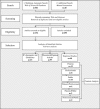Stakeholders' perspectives on biobank-based genomic research: systematic review of the literature
- PMID: 25735479
- PMCID: PMC4795193
- DOI: 10.1038/ejhg.2015.27
Stakeholders' perspectives on biobank-based genomic research: systematic review of the literature
Abstract
The success of biobank-based genomic research is widely dependent on people's willingness to donate their tissue. Thus, stakeholders' opinions should be considered in the development of best practice guidelines for research and recruiting participants. We systematically analyzed the empirical literature describing different stakeholders' views towards ethical questions with regard to type of consent, data sharing and return of incidental findings. Patients are more open to one-time general consent than the public. Only a small proportion desires recontact if the research aim changed. A broad consent model would prevent only a small proportion of patients from participating in research. Although professionals are concerned about a risk of reidentification, patients and the public support data sharing and find that the benefit of research outweighs the potential risk of reidentification. However, they desire detailed information about the privacy protection measures. Regarding the return of incidental findings, the public and professionals focus on clinically actionable results, whereas patients are interested in receiving as much information as possible. For professionals, concrete guidelines that help managing the return of incidental findings should be warranted. For this it would be helpful addressing the different categories - actionable, untreatable and inheritable diseases - upfront with patients and public.
Conflict of interest statement
The manuscript has been read and approved for submission by all authors. This manuscript has not been published elsewhere in part or in entirety, and is not under consideration by another journal. The authors declare no conflict of interest.
Figures

References
-
- Garraway LA, Lander ES: Lessons from the cancer genome. Cell 2013; 153: 17–37. - PubMed
-
- Cambon-Thomsen A: Science and society – rhe social and ethical issues of post-genomic human biobanks. Nat Rev Genet 2004; 5: 866–873. - PubMed
-
- Rothstein MA: Expanding the ethical analysis of biobanks. J Law Med Ethics 2005; 33: 89–101. - PubMed
Publication types
MeSH terms
LinkOut - more resources
Full Text Sources
Other Literature Sources

